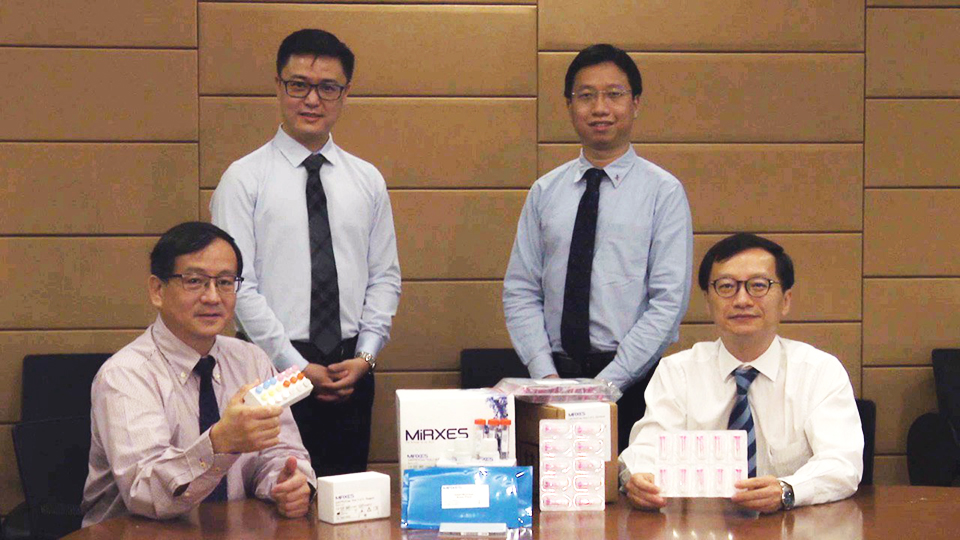Singapore researchers achieve big leap in the early diagnosis of gastric cancer through development of non-invasive blood-based test
Published: 23 Oct 2020

After eight years of discovery research, product development and clinical validation involving 5,248 subjects from Singapore and South Korea, a team of clinicians and scientists from Singapore has developed a non-invasive blood-based diagnostic test for gastric cancer (also known as stomach cancer). The test can potentially be used as a cost effective screening test for the early detection of gastric cancer.
Gastric cancer is the third leading cause of cancer deaths worldwide according to World Health Organization (WHO) statistics. In Singapore, it is the fifth and sixth cause of cancer deaths in males and females respectively, causing approximately 300 deaths every year. Gastric cancer mortality is high due to late presentation. Endoscopy is currently the standard diagnostic test for gastric cancer. However, it is perceived as invasive and expensive, hence many patients are reluctant to undergo endoscopy even if they have gastric symptoms.
Led by Professor Jimmy So, Head and Senior Consultant with the National University Hospital’s (NUH) Division of General Surgery (Upper Gastrointestinal Surgery), Professor Yeoh Khay Guan, Senior Consultant with the NUH Division of Gastroenterology and Hepatology, and Associate Professor Too Heng-Phon from the National University of Singapore Yong Loo Lin School of Medicine’s Department of Biochemistry, the team included clinicians and scientists from the National University Health System (NUHS),the Bioprocessing Technology Institute (BTI) of the Agency for Science, Technology and Research (A*STAR), national platform Diagnostics Development (DxD) Hub, and MiRXES Pte Ltd, a Singapore headquartered molecular diagnostic company which was spunoff from A*STAR’s BTI.
The team started this project in 2012 by first examining 578 microRNA candidates in 682 patients. They discovered a panel of 12-microRNA biomarkers that can differentiate gastric cancer patients from normal patients with an accuracy over 92%. Based on this panel of 12-microRNA biomarkers, the team created a clinical assay (or test kit) which was manufactured to clinical standards. From year 2013 to 2018, the team validated this blood panel in a multicentre cohort involving more than 5,000 subjects from Singapore, making this study the most extensive evaluation of circulating microRNAs as biomarkers for gastric cancer detection to date worldwide.
The performance of this test was confirmed with endoscopies and biopsies and was shown to detect gastric cancer with high sensitivity across age groups, genders, ethnicities and tumour stages. The test is able to detect 87% of all gastric cancers, including 87.5% of patients with stage I cancers.
In addition, the results showed that this blood-based test was more accurate than any of the existing conventional blood-based biomarker tests for gastric cancer detection. The findings were published in Gut, a leading international medical journal in October 2020.
Based on a cost-effectiveness analysis to explore the economic and health impact of using the test in a hypothetical national screening programme in Singapore, the team has found that it may be a cost-effective screening tool for gastric cancer in high-risk groups as it costs much less than endoscopy.
This test thus provides an alternative solution for those who would like a better understanding of their risk of contracting gastric cancer in evaluating their need for endoscopy. Results from this test would help to identify patients who are at high risk of stomach cancer to undergo endoscopy, thereby reducing the reliance on endoscopy.
Associate Professor Too emphasised that, “the test does not replace endoscopic evaluation. We believe this assay provides an option for patients who might not be keen on initial endoscopic screening and adds to the current cancer detection tool armamentarium, just as the stool DNA test is an option for colon cancer screening. Furthermore, the convenience and non-invasiveness of this test allows the public to have access to better health-care”.
Read more in the press release here.

